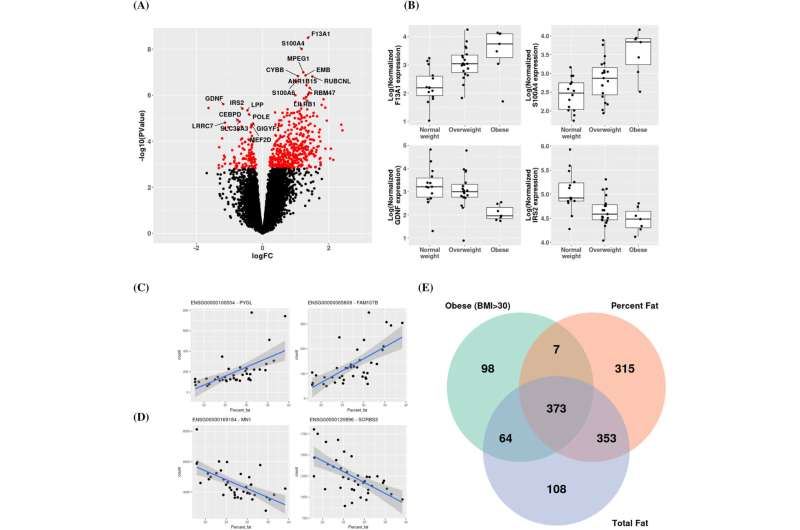This article has been reviewed according to Science X's editorial process and policies. Editors have highlighted the following attributes while ensuring the content's credibility:
fact-checked
trusted source
proofread
Obesity in later life may cause muscles to age faster

New research has shown genes linked with a longer life are less active in the muscles of older men who are overweight or living with obesity.
Obesity is a problem affecting all age groups that is now common in older people—in the UK, 81 percent of those aged 65-74 are now overweight or living with obesity.
Researchers from the University of Southampton and University Hospital Southampton led a study looking at the effect of obesity on muscle health in older age. The collaboration was supported by the National Institute for Health and Care Research (NIHR) Southampton Biomedical Research Centre.
The team took samples of thigh muscle from 40 older men, with an average age of 73 years. All of them were participants in the Hertfordshire Sarcopenia Study.
They used BMI to determine if the men were a healthy weight, overweight or obese. Each participant also had a dual-energy X-ray absorptiometry (DXA) scan. This measured their body composition—the relative amounts of fat, bone, and muscle in their body.
Using a variety of laboratory techniques, the team assessed the activity of key genes within the muscle samples. They showed genes associated with a longer life expectancy were less active in the muscles of men who were overweight or living with obesity, compared to those that were a healthy weight.
They also found genes that help muscles use energy effectively were less active, while genes linked to inflammation were more active.
Professor Karen Lillycrop, Professor of Epigenetics at the University of Southampton, said, "Our research has shown fundamental differences in the genetic regulation of older men's muscles who are living with obesity."
"We found many genes associated with a long life are 'switched off' and no longer active. This suggests obesity may accelerate the aging process in men's muscles, and could contribute to the development of sarcopenia."
Muscle loss occurs in almost everyone as they get older, but the rate at which it occurs is influenced by lifestyle. Strength-building exercise, such as walking or lifting, can slow the rate of muscle loss.
Excessive loss of muscle strength and mass is known as sarcopenia. It is a common cause of frailty, fractures and falls in later life.
Improving our understanding of the factors that influence muscle loss as we age, such as obesity, could help identify new ways to prevent and treat sarcopenia.
Their findings, published in the Journal of Cachexia, Sarcopenia and Muscle, highlight the benefits of maintaining a healthy weight and suggest new approaches for supporting healthy aging.
Professor Keith Godfrey, who leads the NIHR nutrition research in Southampton, said, "Low muscle mass and strength are important contributors to poor health in people living with obesity. Measures to support muscle health can make an important contribution to retaining people in the workforce and to them having greater independence in older age."
Dr. Harnish Patel, Principal Investigator of the Hertfordshire Sarcopenia Study, added, "The study findings underscore the importance of having a balanced diet and an active lifestyle throughout life to mitigate adverse effects obesity might have on muscle health."
More information: Mark A. Burton et al, Adiposity is associated with widespread transcriptional changes and downregulation of longevity pathways in aged skeletal muscle, Journal of Cachexia, Sarcopenia and Muscle (2023). DOI: 10.1002/jcsm.13255


















